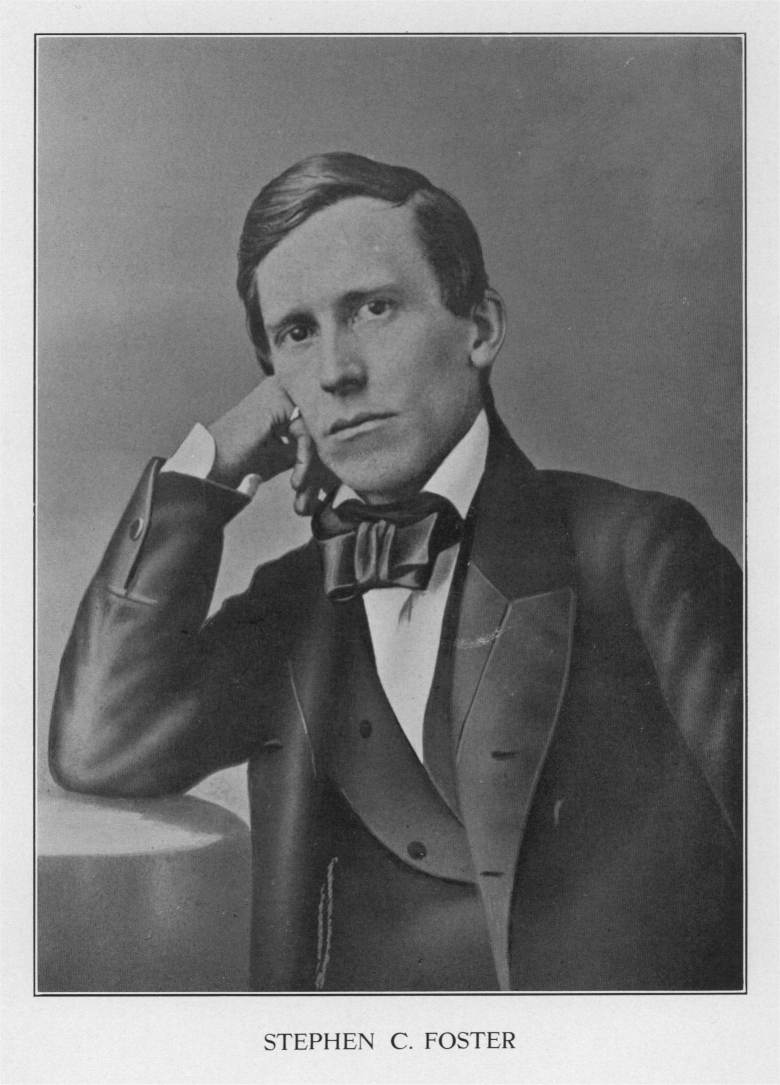Stephen Foster (Stephen Foster)

Foster attended private academies in Allegheny, Athens, and Towanda, Pennsylvania. He received an education in English grammar, diction, the classics, penmanship, Latin, Greek, and mathematics. In 1839, his elder brother William was serving his apprenticeship as an engineer at nearby Towanda and thought Stephen would benefit from being under his supervision. The site of the Camptown Races is 30 miles from Athens and 15 miles from Towanda. Stephen attended Athens Academy from 1839 to 1841. He wrote his first composition, Tioga Waltz, while attending Athens Academy and performed it during the 1841 commencement exercises; he was 14. It was not published during the composer’s lifetime, but it is included in the collection of published works by Morrison Foster. In 1842, Athens Academy was destroyed in a fire.
Foster’s education included a brief period at Jefferson College in Canonsburg, Pennsylvania, (now Washington & Jefferson College). His tuition was paid, but he had little spending money. Sources conflict on whether he left willingly or was dismissed, but, either way, he left Canonsburg to visit Pittsburgh with another student and didn’t return. During his teenage years, Foster was influenced greatly by two men. Henry Kleber (1816–1897), one of Stephen’s few formal music instructors, was a classically trained musician who emigrated from Darmstadt, Germany, to Pittsburgh and opened a music store. Dan Rice was an entertainer, a clown, and blackface singer, making his living in traveling circuses. Although respectful of the more civilized parlor songs of the day, Rice and his friends would often sit at a piano, writing and singing minstrel songs through the night. Eventually, Foster learned to blend the two genres to write some of his best-known work.
In 1846, Foster moved to Cincinnati, Ohio, and became a bookkeeper with his brother’s steamship company. While in Cincinnati, Foster penned his first successful songs—among them “Oh! Susanna,” which became an anthem of the California Gold Rush—in 1848–1849. In 1849, he published Foster’s Ethiopian Melodies, which included the successful song “Nelly Was a Lady”, made famous by the Christy Minstrels. A plaque marks the site of Foster’s residence in Cincinnati, where the Guilford School building is now located. Then he returned to Pennsylvania and signed a contract with the Christy Minstrels. It was during this period that Foster would write most of his best-known songs: “Camptown Races” (1850), “Nelly Bly” (1850), “Old Folks at Home” (known also as “Swanee Ribber”, 1851), “My Old Kentucky Home” (1853), “Old Dog Tray” (1853), and “Jeanie With the Light Brown Hair” (1854), written for his wife Jane Denny McDowell.
Many of Foster’s songs were of the blackface minstrel show tradition popular at the time. Foster sought, in his own words, to, “… build up taste … among refined people by making words suitable to their taste, instead of the trashy and really offensive words which belong to some songs of that order.” Many of his songs had Southern themes, yet Foster never lived in the South and visited it only once in 1852, by riverboat voyage on his honeymoon on his brother Dunning’s steamboat the Millinger, which took him down the Mississippi to New Orleans. Foster attempted to make a living as a professional songwriter and may be considered innovative in this respect, since this field did not yet exist in the modern sense. Due in part to the limited scope of music copyright and composer royalties at the time, Foster realized very little of the profits his works generated for sheet music printers. Multiple publishers often printed their own ($2,653 in 2012 dollars) for “Oh, Susanna”. Although he barely made anything for his award-worthy songs, in today’s industry he would have made a million dollars a year.
Foster moved to New York City in 1860. About a year later, his wife and daughter left him and returned to Pittsburgh. Beginning in 1862, his fortundid, so did the quality of his new songs. Early in 1863, he began working with George Cooper, whose lyrics were often humorous and designed to appeal to musical theater audiences. The Civil War created a flurry of newly written music with patriotic war themes, but this did not benefit Foster. During this time he composed a series of Sunday School hymns, including “Give Us This Day” (1863).
Foster had become impoverished while living at the North American Hotel at 30 Bowery on Manhattan’s Lower East Side. Reportedly confined to his bed for days by a persistent fever, Foster tried to call a chambermaid, but collapsed, falling against the washbasin next to his bed and shattering it, which gouged his head. It took three hours for a doctor and George Cooper to be summoned and get him to Bellevue Hospital. In an era before transfusions and antibiotics, he succumbed three days after his admittance, aged 37. His worn leather wallet contained a scrap of paper that simply said, “Dear friends and gentle hearts”, along with 38 cents in Civil War scrip and three pennies. The note is said to have inspired Bob Hilliard’s lyric for Dear Hearts and Gentle People. Foster was buried in the Allegheny Cemetery in Pittsburgh. One of the best loved of his works, Beautiful Dreamer, was published shortly after his death.
Born
- July, 04, 1826
- USA
- Lawrenceville, Pittsburgh, Pennsylvania
Died
- January, 13, 1864
- USA
- New York City, New York
Cemetery
- Allegheny Cemetery
- Pittsburgh, Pennsylvania
- USA





